I’ve always kept an eye on titles newly released on the market every month or week and trends in the Korean and French book markets while introducing and translating Korean works as a member of a French publisher Philippe Picquier in charge of Korean literature collections. Knowing everything in both markets is essential for selecting and bringing Korean works that will suit the tastes of French readers. In addition, the information shared by Philippe Picquier’s head on the tastes and preferences of French readers is also extremely useful when choosing Korean works.
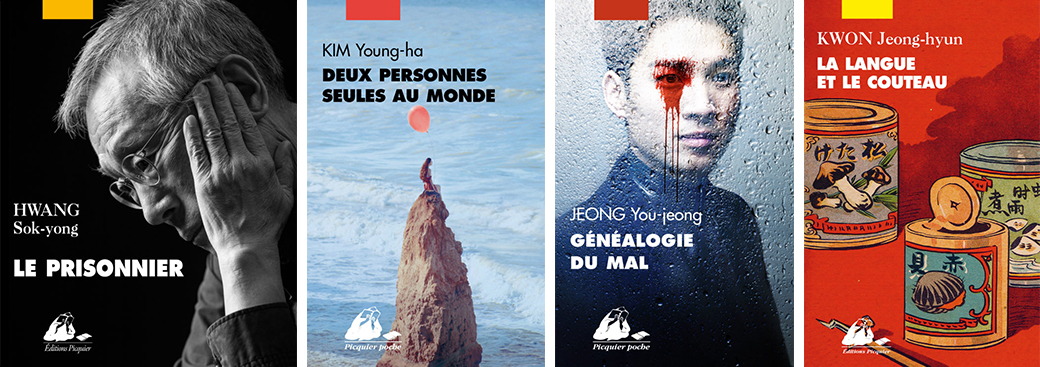
Korean works recently published by Philippe Picquier.
From left, The Prisoner, Only Two People, The Good Son, and Sword and Tongue
Fiction occupies a prominent place among Korean books brought to France. Two non-fiction titles were introduced in 2018 – Jungmok Sunim’s The Emptier, the Fuller (Sam & Parkers), and Lee Mi-Kyung’s Happy Memories, Corner Shops in Korea (Namhaebomnal), but as the response from local readers’ was weaker than expected, it makes me reluctant to continue bringing in other non-fiction Korean works. It is thought that perhaps the different emotional climate of the two countries is hindering Korean humanity titles or essays to penetrate the French market.
Meanwhile, Korean picture albums for children, comics, and graphic novels have been steadily moving in. It seems that Korean fiction has begun to draw attention in the French publishing circle with support from project managers or translators like myself and literary agents that have international networks.
In January 2020, Cho Nam-Ju’s Kim Jiyoung, Born 1982, published by the French publisher Nil recorded more than almost 10 thousand copies sold in France with the feminist boom and the Me-Too movement around the globe. It was almost the biggest commercial success among the Korean fictions brought to France to date. The book was also a bestseller and regular seller in Korea with over 1 million readers, but success in the Korean market does not always guarantee international success. Several French critics commented that the reason for the success of the book in France was its most central and universal message of feminist movements seeking to advance women’s rights (rights as an independent human being rather than being just a mom, wife, or daughter-in-law) delivered through specific elements such as the patriarchal social atmosphere and personal stories of protagonist Kim Ji-Young. Clair Do Sêrro of publisher Nil, who chose to present this book to French readers, commented in this context in an interview. He said: Through the very personal stories of an individual, this book exposes the reality of situations that many women routinely experience today. Even in the French society, which served as a foundation for great female activists like Simone de Beauvoir, many women relate to the life of Kim Ji-Young today to some degree.
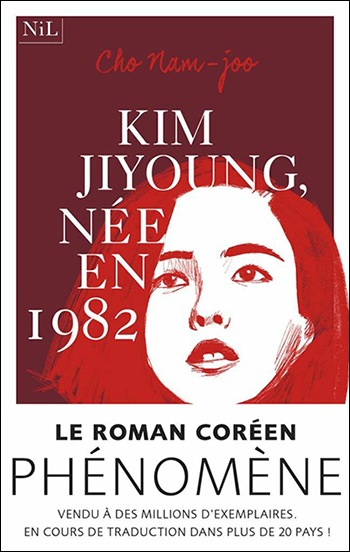
French edition of Kim Jiyoung, Born 1982
Once a Korean book makes a commercial success in France, it makes a great contribution to drawing the attention of French publishers and bookstores to Korean literature, creating more room for project managers, translators, and agents that introduce Korean works to the market. Today, more and more French publishers are publishing Korean fiction, charting an upward curve in Korean literary works published in France. In particular, the figures have grown exponentially since the establishment of Matin Calme in January last year, which is a publisher specialized in Korean crime fiction.
The titles of the main books published in France in the last three years since 2018 and their publishers are listed below. It includes only Korean fiction translated into French, and therefore does not include all Korean books. (By author’s name, French publisher’s name, title, year of publication in France)
- Hwang Sok-Yong, Philippe Picquier, The Prisoner (Munhakdongne Publishing Group), 2021.
Baridegi (Changbi Publishers), Familiar Things (Munhakdongne Publishing Group), Dusk (Munhakdongne Publishing Group), etc. were published by Philippe Picquier since 2013. Seven other works were published by Zulma and one by Safran before. - Kim Young-Ha, Philippe Picquier, Only Two People (Munhakdongne Publishing Group), 2019.
Seven titles, including Your Republic is Calling You (Munhakdongne Publishing Group) and A Murderer’s Mnemonics (Munhakdongne Publishing Group), were published by the same publisher. - Gong Ji-Young, Philippe Picquier, The Crucible (Changbi Publishers), 2020.
Titles including Maundy Thursday (Hainaim Publishing), My Sister Bongsoon (MiraeN), and Tall Blue Ladder (Hainaim Publishing) were published by the same publisher since 2014. - Jeong You-Jeong, Philippe Picquier, A Good Son (EunHaeng NaMu Publishing), 2018 / Jini, Jinny (EunHaeng NaMu Publishing), 2021.
Seven Years of Darkness (EunHaeng NaMu Publishing) was published by Decrescenzo in 2016, and 28 (EunHaeng NaMu Publishing) is scheduled to be published by Matin Calme in 2022. - Kwon Jeong-Hyun, Philippe Picquier, Sword and Tongue (Dasan Books), 2019.
- Ju Won-Kyu, Philippe Picquier, Made in Gangnam (Jaeum & Moeum Publishing), 2021.
- Pyeon Hye-Young, Rivage Noir, The Hole (Munji Publishing), 2019 / The Laws of Lines (Munhakdongne Publishing Group), 2021.
City of Ash and Red: A Novel (Changbi Publishers) was published by Philippe Picquier in 2012, and two short-story collections were published by Decrescenzo. - Jang Kang-Myung, Decrescenzo, The Bleached (Hankyoreh Publishing Company), 2019.
Because I didn’t like Korea (Minumsa Publishing) was published by Philippe Picquier in 2016. - Chung Myung-Seop, Decrescenzo, Seoul Zone Interdite (Jaeum & Moeum Publishing), 2018.
- Jang Yong-Min, Decrescenzo, The Ultimate Child (Elixir), 2018.
- Kim Tae-Yong, Decrescenzo, The Pig on the Grass (Munji Publishing), 2020.
- Kim Un-Su, Matin Calme, The Boiling Blood (Munhakdongne Publishing Group), 2020.
The Cabinet (Munhakdongne Publishing Group) was published by Ginkgo in 2013, The Plotters (Munhakdongne Publishing Group) was published by Aube in 2016, and Jab! (Munhakdongne Publishing Group) was published by Serge Safran in 2018. - Suh Mi-Ae, Matin Calme, The Only Child (Elixir), 2020.
- Do Jin-Ki, Matin Calme, The Portrait of La Traviata (Goldenbough), 2020.
- Jung Jae-Han, Matin Calme, The Minamdang Case Diary (CABINET), 2020.
- Song Si-Woo, Matin Calme, Here Comes the Black Dog (SIGONGSA), 2020.
- Lee Jong-Kwan, Matin Calme, On-Site Inspection (GOZNOCK ENT), 2020.
- Ban Si-Yeon, Matin Calme, Abyss (INDIEPAPER), 2020.
- Park Yeon-Seon, Matin Calme, Summer, a Corpse Somewhere (Dasan Books), 2021.
- Kim Jae-Hee, Matin Calme, Case on the Island (SIGONGSA), 2021.
- Jang Min-Hye, Matin Calme, The Insect (GOZNOCK ENT), 2021.
- Cho Nam-Ju, Nil, Kim Jiyoung, Born 1982 (Minumsa Publishing), 2021.
- Kim Tak-Hwan, Asiathèque, It’s a Lie (Booksfear), 2020.
The Banggakbon Murder Case (Minumsa Publishing) was published by Philippe Picquier in 2010.
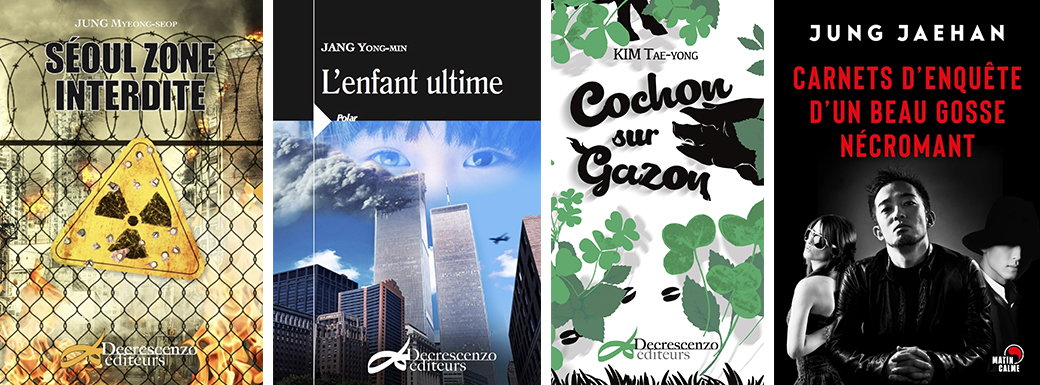
French editions of Seoul Zone Interdite, The Ultimate Child, The Pig on the Grass, and The Mindamdang Case Diary
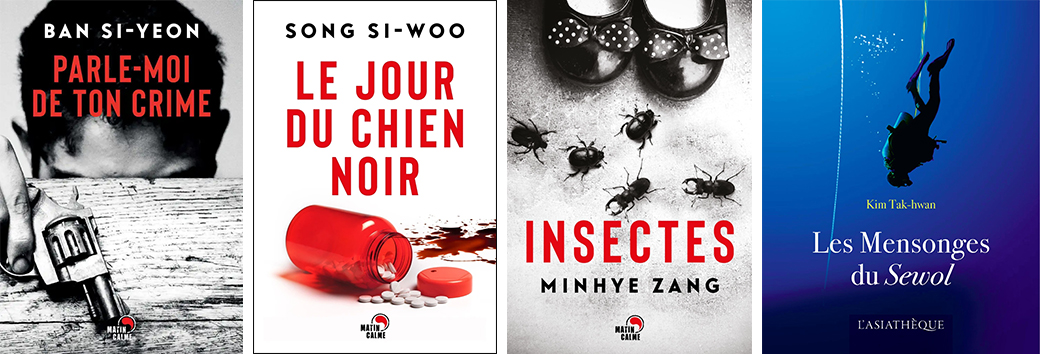
French editions of Abyss, Here Comes the Black Dog, The Insect, and It’s a Lie
On top of these titles, publisher La Croisée, which has never published Korean literary works up to date, is planning to publish The Disaster Tourist (Minumsa Publishing) by writer Yun Ko-Eun in October this year. It won the CWA Daggers award at the 2021 CWA Daggers of the UK’s Crime Writers’ Association (CWA). It is particularly easier to bring Korean books to the French market if they have won a literary award in English-speaking countries, which also affects their sales performance. For instance, The Hole, written by Pyeon Hye-Young, which I translated, served as the trigger for publisher Rivage Noir to start taking an interest in Korean literature and publish it in France as it won the Shirley Jackson Award in the US. It also had a fairly good commercial output, selling more than 4,000 copies. Beginning with this success, Rivage Noir released The Laws of Lines, written by the same author earlier this year, showing a constant interest in Korean fiction.
If you look at the list above, you will realize that over 70% are genre literature, in other words, hardboiled fiction. This was particularly influenced by the establishment of publisher Matin Calme in 2020. Still, as a balanced reader with no particular genre preference, I also found myself recently introducing crime fiction or thriller works without intent, when looking for fine works in the Korean market. This implies that more high-quality genre literature with strong narrative power, perfect for introduction into foreign markets, is published in the Korean publishing industry.
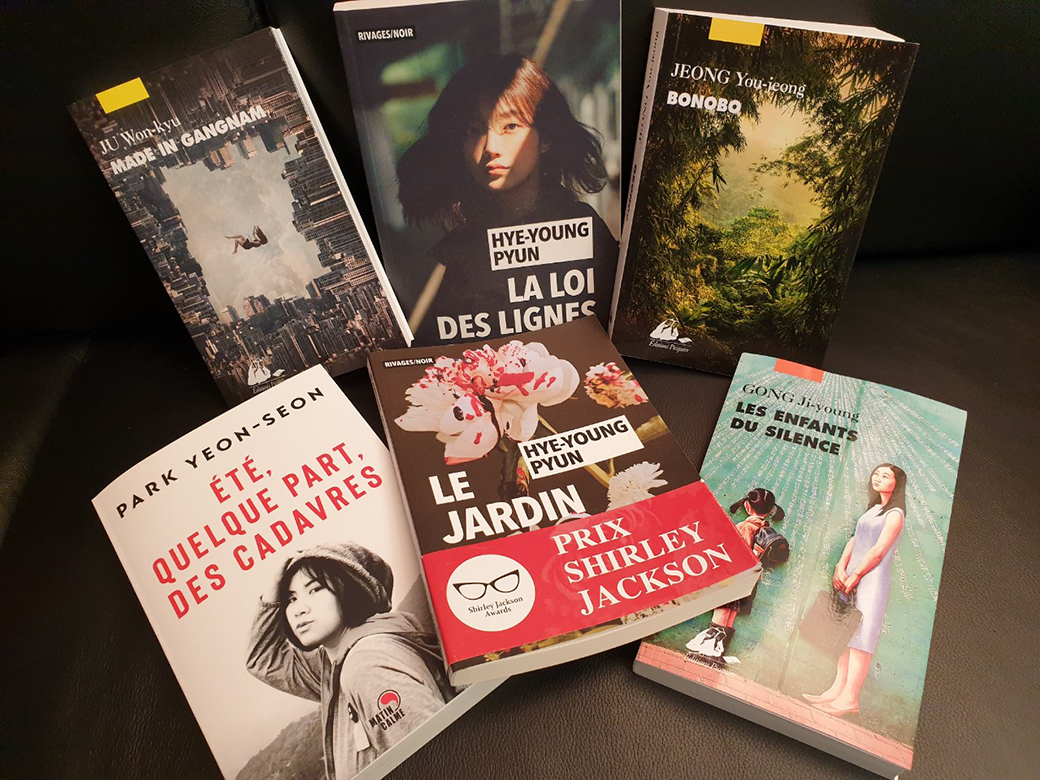
Works I’ve recently translated, from top left: Made in Gangnam, The Laws of Lines, Jini, Jinny, Summer, a Corpse Somewhere, The Hole, and The Crucible
The driving force behind the success of hardboiled fiction is the writer’s storytelling skills, which makes readers breathless from start to finish. To pick Korean authors that had their skills recognized in genre literature in France, it would be Jeong You-Jeong, Pyeon Hye-Young, Seo Mi-Ae, and Kim Un-Su, with sales records of 3-4 thousand copies. However, topics or themes are greater determinants of success when it comes to general fiction. Aforementioned Kim Jiyoung, Born 1982 is one example, and French readers have also recognized The Crucible by Gong Ji-Young for the author’s bold courage to reveal society’s unreasonable reality.
The topics or themes I have been looking for or interested in lately are social engagement that points to irregularities in society, the relationship between humanity and animals, environmentalism, feminism, and natural therapy.
Written by Lim Yeong-Hee (Project manager of Korean literature at Philippe Picquier, Korean-French translator)













